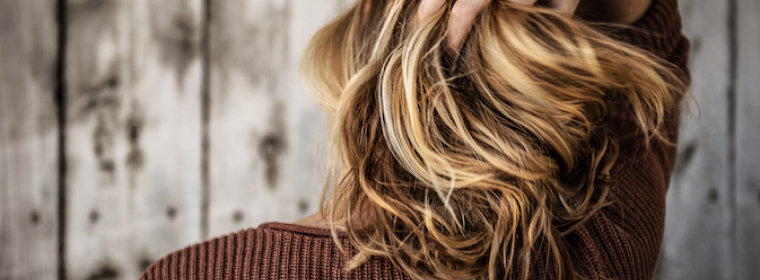
Mycotic Conditions are those caused by yeast and fungus. A lipid dependent yeast that is normally found on the scalp, called Malessezia, feeds on the lipids from sweat glands and likely plays a role in dandruff and seborrheic dermatitis.
- Dandruff: up to 50% of the population experiences dandruff at some point in their lives. Usually seen in individuals from adolescence to about age 50 when the sebaceous glands are most active. Fine white or gray scales are found diffusely in the scalp. Most people experience itching.
- Seborrheic dermatitis: this itchy scalp condition lasts beyond 50 years of age and is usually chronic and recurring. Red patches, with large yellow greasy scales that may form crusts, commonly occur in the scalp, on the face (eyebrows, nasolabial folds, and eyelid margins), ears, armpits, groin and mid chest. MIld itching is common. It is most common in immunocompromised patients and in patients with neurological illnesses like Parkinson's and stroke patients.
Treatment: antifungal shampoos with the following ingredients may be helpful, pyrithione zinc, selenium sulfide, cicloprox, and ketoconazole. Both over-the-counter (OTC) and prescription products are available depending on severity. Sometimes coal tar or salicylic acid shampoos are beneficial. In severe cases, topical corticosteroids are used.
Itchy scalp caused by true fungal infections or "ringworm" (dermatophytes) is called tinea capitis.
- Tinea capitis: certain fungal organisms can infect the hair shaft itself, while others infect the hair follicle. This contagious condition is most commonly seen in pre-pubescents but can be seen in anyone. It is spread by contact with people, animals, and found in soil. Sharing pillows, hairbrushes and clothing (hats) may spread the condition. There are inflammatory (with pustules, abscesses, and often, lymph node swelling) and non-inflammatory infections (round patches of hair loss with fine scale).
Treatment: Prescription oral medication including griseofulvin, iatroconazole and terbinafine are most effective. Anti-fungal shampoos are prescribed, as well. Family members of infected individuals should be treated with antifungal shampoos and family pets should be checked for infection.
Parasitic Conditions: Head lice, also known as Pediculosis humanus capitis, is the most common parasitic infection to cause an itchy scalp. This infestation is seen most commonly in school aged children. Lice and their eggs (nits) are frequently seen in the posterior auricular scalp (area behind the ears) and occiptal scalp (lower posterior). Lice (3 mm) and nits (0.8mm) can be seen with the naked eye. Nits, yellow to white oval encasings, usually attach to the hair shaft closest to the scalp. Lice prefer straight hair to curly hair. Lice are transferred from head to head by clothing, hairbrushes and pillows. Itching is very common. Sometimes secondary bacterial infection is seen due to scratching. Lymph node swelling and fever can also be seen in more severe infections.
Treatment: Pediculocide shampoos, lotions, and creams containing the ingredients permethrin or malathion applied once and repeated 6-7 days later is the most effective therapy. Nits can be removed with a fine-toothed comb. Bedding should be washed in hot water, clothing that has been worn should be washed and all family members should be inspected for possible infestation and appropriately treated.
Inflammatory Conditions: the most common cause of inflammatory scalp itching is psoriasis. Psoriasis is a chronic, recurring condition that affects 2% of the populaton (a half of whom have scalp involvement.) There is often a family history of the disease. Red areas with silver-gray scaly patches are seen anywhere on the scalp, but especially along the hairline.
Treatment: Mild cases may improve with tar shampoos. Keratolytic shampoos (salicylic acid) are often helpful removing the scales. Topical steroids are the mainstay of treatment. In severe cases, oral medication (methotrexate, cyclosporine) is prescribed. Injectable immunobiologics are also an option for patients with severe psoriasis.
If persistent scalp itching is experienced, seek medical attention.





